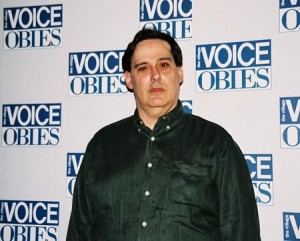Theater Criticism: The Happy End of Business as Usual
By Bill Marx

Village Voice critic Michael Feingold: Serious Theater Criticism Will Make a Comeback
Veteran “Village Voice” theater critic Michael Feingold has written a good column on the tragic news, for some, that the Broadway League and the American Theatre Wing, the organizations that jointly manage Broadway’s annual Tony Awards, have decided to remove the first-night theater press from the ranks of Tony voters.
Some hand-wringers charge that the demotion aids the demise of theater reviewing in major newspapers and magazines. They feel that critics, by asserting high standards, were valuable additions to the Tony decision-making process. Feingold’s eminently sane reaction is flat out happiness that, no longer obligated to be a conscientious Tony voter, he doesn’t have to sit though a lot of what passes for “theater” on Broadway today.
Since the column inches reserved for theater coverage in the “Voice” are shrinking, there will be no review of potential Tony-winning shows such as the soon-to-open ballroom-dance sensation “Burn the Floor” from Australia. And who cares? What’s more, Feingold argues that critics never had much meaningful influence on the Tony Awards anyway – frankly, it is my experience that drama awards are much more about diplomacy than about recognizing merit, even when the judging panel is made up exclusively of critics.
Feingold’s comments on the future of arts commentary interest me because he is not filled with doom and gloom. He sees that the death of one approach to cultural criticism (and how it reaches readers) will make way for other forms of evaluation and distribution:
Our time is an exceptionally rough one for criticism. With the dizzying changes in the way we communicate altering the whole fabric of our social life, we are going through a double revolution, and revolutions are never optimal moments for integrity and clarity of thought. The critic—whether viewed by the theater as an enemy, a necessary gadfly, a creative partner, or a poor relation to be tolerated—was never more than a small part of the picture. The theater that leans on critics as a crutch, deriving its own estimate of its worth from its reviews, is probably in as unhealthy a state as the theater with no critical guidance or intellectual perspective at all. Somewhere between those two conditions, the new world that the Internet has caused will probably find a healthier middle way for the astute critical sensibility to function as part of the theater. We can’t guess yet what that will be, because we can’t predict what the theater will become. Today’s world has abolished business as usual.
One clue for criticism’s future may lie in the aspect of its essence most overlooked in the current upheavals. The instant thumbs-up or thumbs-down so beloved by the Internet is only the smallest part of a critic’s job. The rest involves writing—exploring, simultaneously, the work under review and the critic’s response to it. Oscar Wilde’s definition of criticism applies: “the record of a soul.” The habit of reading critics of the past has ebbed in recent decades. But many cultural habits have ebbed and been revived over the centuries. Phenomena like Kindle and GoogleBooks may yet bring this one back, too. The pleasures that lie in wait for readers who love theater may be ending only to begin all over again.
Because Feingold brings an astute historical perspective to his analysis of the current transition in arts criticism he recognizes that, in the future, reviewing will evolve and perhaps thrive. At the moment, we are caught between the end of the old journalistic model for reviewing and the rise of myriad varieties of online revisions/reinventions of cultural reaction. Early on the emphasis has, predictably, been on criticism-as-verdict rather than on the review as an articulation of the reasons behind a response. A dutiful critic has to take the arts seriously by writing (or podcasting or videocasting) in ways that educate and provoke the community.
Feingold points out that a lot of online reviews reek of celebrity worship and/or conflicts of interest. But so did a goodly amount of the stage criticism in the supposed “good old days.” The Wild West of today’s online arts reviewing world mirrors what criticism was like in the roughhouse-aplenty 18th and early 19th centuries. Out of that chaos came a vibrant appetite for substantial criticism and a number of terrific writers who satisfied the need for intellectual perspective. Feingold recognizes that there is some excellent writing on the stage in the blogosphere. That is a harbinger of refreshment to come: it is going to be fascinating to see criticism replenish itself again, once business as usual is abolished for good.
Tagged: arts, criticism, Michael Feingold, online, Persona Non Grata, reviewing, Theater

[…] Continued here: Theater Criticism: The Happy End of Business as Usual […]